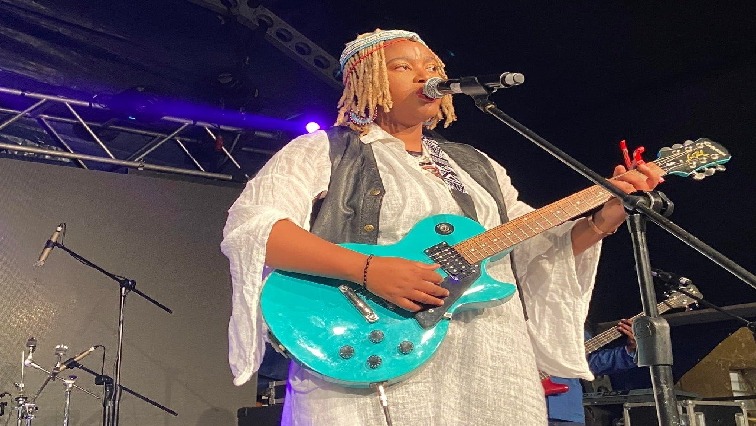JOHANNESBURG (Reuters) - Backed by silky synthesizers and down-tempo electronic beats, South African singer Msaki's new Afropop album revisits the 2012 killing by police of dozens of striking mine workers that she says inspired her to protest against social injustice.

© Reuters/SIPHIWE SIBEKO FILE PHOTO: Boys play soccer in Marikana's Nkaneng township in front of the Lonmin's Marikana platinum mine in Rustenburg
Singing in her Xhosa mother tongue, Msaki's lilting voice aims to capture the sadness and disappointment felt by many after the showdown between police and strikers at the Marikana platinum mine 110 kms (68 miles) northwest of Johannesburg.
Forty-four people died there in the most violent police crackdown since the end of white minority rule.
'Platinumb Heart Beating' was released at the end of last year. The title is a play on words, referring to South Africa's platinum belt but also to "the emotional state of numbness" that many felt after witnessing such police brutality, she said.
"The first song I wrote was 'Blood, Guns and Revolutions' which was about Marikana and the platinum belt," she told Reuters TV in an interview. "It seemed fitting. That was the moment that got me moving to make an album of protest."
Among those killed in what has become known as the "Marikana massacre" were 34 miners whom police shot dead at the Lonmin mine. For many South Africans, it seemed to dash hopes that the violent state repression of protests had been relegated to their ugly apartheid past.
August this year marks the 10th anniversary of the massacre.
An investigation into the deaths released by then President Jacob Zuma blamed Lonmin, the police and trade unions for the killings.
Msika's songs also feature some household names in South Africa's dance music scene, including DJ Black Coffee, Kabza De Small and rapper Focalistic.
(Reporting by Taurai Maduna,; Writing by Tim Cocks; Editing by Emelia Sithole-Matarise)
Singing in her Xhosa mother tongue, Msaki's lilting voice aims to capture the sadness and disappointment felt by many after the showdown between police and strikers at the Marikana platinum mine 110 kms (68 miles) northwest of Johannesburg.
Forty-four people died there in the most violent police crackdown since the end of white minority rule.
'Platinumb Heart Beating' was released at the end of last year. The title is a play on words, referring to South Africa's platinum belt but also to "the emotional state of numbness" that many felt after witnessing such police brutality, she said.
"The first song I wrote was 'Blood, Guns and Revolutions' which was about Marikana and the platinum belt," she told Reuters TV in an interview. "It seemed fitting. That was the moment that got me moving to make an album of protest."
Among those killed in what has become known as the "Marikana massacre" were 34 miners whom police shot dead at the Lonmin mine. For many South Africans, it seemed to dash hopes that the violent state repression of protests had been relegated to their ugly apartheid past.
August this year marks the 10th anniversary of the massacre.
An investigation into the deaths released by then President Jacob Zuma blamed Lonmin, the police and trade unions for the killings.
Msika's songs also feature some household names in South Africa's dance music scene, including DJ Black Coffee, Kabza De Small and rapper Focalistic.
(Reporting by Taurai Maduna,; Writing by Tim Cocks; Editing by Emelia Sithole-Matarise)
 Twitter@SAMusicTV
Twitter@SAMusicTV
No comments:
Post a Comment